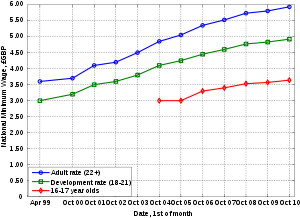- National Minimum Wage Act 1998
-
National Minimum Wage Act 1998 
Parliament of the United KingdomLong title ... Statute book chapter 1998 Territorial extent England and Wales; Scotland; Northern Ireland Dates Royal Assent 1998 Status: Current legislation Text of statute as originally enacted Official text of the statute as amended and in force today within the United Kingdom, from the UK Statute Law Database - This article is about an Act of Parliament in the United Kingdom. For other uses, see NMWA (disambiguation).
The National Minimum Wage Act 1998 creates a minimum wage across the United Kingdom, currently £6.08 per hour for workers aged 21 years and older, £4.98 per hour for workers aged 18–20.[1] It was a flagship policy of the Labour Party in the UK during its 1997 election campaign and is still pronounced today in Labour Party circulars as an outstanding gain for ‘at least 1.5 million people’. The national minimum wage (NMW) took effect on 1 April 1999.
Contents
Background
No national minimum wage existed prior to 1998, although there were a variety of systems of wage controls focused on specific industries under the Trade Boards Act 1909. Part of the reason for Labour's minimum wage policy was the decline of trade union membership over recent decades (weakening employees' bargaining power), as well as a recognition that the employees most vulnerable to low pay (especially in service industries) were rarely unionised in the first place. The implementation of a wage was opposed by the opposition Conservative Party and Liberal Democrats.
- S Webb and B Webb, Industrial Democracy (1898)
- Liberal reforms
- Trade Boards Act 1909
- Trade Boards Act 1918
- Cave Committee 1921
- Wages Councils Act 1945
- Terms and Conditions of Employment Act 1959
- Wages Councils Act 1959
- Tax Credits and Child tax credit, Working tax credit
- Wage regulation
- Fair Labor Standards Act of 1938, which introduced the minimum wage in the US
- Incomes policy
Overview
The following minimum wage amounts apply (as of 1 October 2010):[2]
- £5.93 per hour for adult workers (21+)
- £4.92 per hour for 18-to-20-year-old
- £3.64 per hour for under-18s who have finished compulsory education
- £2.60 per hour for apprentices under 19 years old
- None for those who have not yet finished compulsory education (the age when a person finishes compulsory education is either 15 or 16, depending on where their birthday falls in the school year)
A £4.51 a day deduction can be made for living accommodation. No extra benefits such as redundancy, pension payments, loans, or awards can be counted as pay. The NMW rates are reviewed each year by the Low Pay Commission and from 1 October 2011:
- the main rate for workers aged 21 and over will increase to £6.08
- the 18-20 rate will increase to £4.98
- the 16-17 rate for workers above school leaving age but under 18 will increase to £3.68
- the apprentice rate, for apprentices under 19 or 19 or over and in the first year of their apprenticeship will increase to £2.60
Law
Sources on wages National Minimum Wage Act 1998 (c 39)National Minimum Wage Regulations 1999 (SI 1999/584)Employment Act 2008 ss 8-12Edmonds v Lawson QC [2000] EWCA Civ 69James v Redcats (Brands) Ltd [2007] IRLR 296British Nursing Assn v Inland Revenue [2002] EWCA Civ 494Scottbridge Construction Ltd v Wright [2002] ScotCS 285Walton v Ind Living Organisation [2003] EWCA Civ 199Leisure Employment Ltd v HMRC [2007] EWCA Civ 92see Minimum wage in the United Kingdom The National Minimum Wage Act 1998 is universally applicable to ordinary workers (section 1(2)), that is, anyone who has a contract to do work, except for a consumer or a client (section 54(3)). Expressly included are those working through job agencies (section 34), so that the agencies' charges must not eat into a worker's basic entitlement. Home-workers are also included expressly, and the Secretary of State can make order for other inclusions. The Secretary of State can also make exclusions, as has been done for au pairs and family members in family business. Excluded by the Act are fishermen paid in a share of profits, unpaid volunteers and prisoners (sections 43-45).
The hours that are used in a national minimum wage calculation are dependent upon work type as defined within the National Minimum Wage Regulations 1999. The different work types are time work, salaried hours work, output work and unmeasured work. Hours to be paid for are those worked in the "pay reference period", but where pay is not contractually referable to hours, such as pay by output, then the time actually worked must be ascertained. The principle is a very basic one: that hours worked should never as a whole be paid below the minimum. Excluded from "worked" are periods when the worker is on industrial action, time travelling to and from work and absent periods. When a worker is required to be awake and available for work, then they must also be paid, however this does not prevent so called "zero hour contracts" being used. That means you are guaranteed no hours, theoretically you are under no obligation, but it is strongly in your interest to be ready to work if your employer requests.
Enforcement
The NMW is enforceable by a contractual claim or through section 13 of the Employment Rights Act 1996 or if the exploited worker demands to see his employer's records and is refused. Section 18 provides for compensation to the order of 80 times the minimum wage. Employers must not subject their workers to dismissal or any other detriment (section 25 and section 23). Nevertheless employees may not wish to take the risk while employed. (Some employees might not enforce their rights even if dismissed, such as illegal immigrants, who face being sent home if they claim.) Administrative enforcement by Inspectors (section 14) provides more help. Inspectors may order compliance and payment (section 19). This may be appealed by the employer, but ongoing failure to comply entails cumulative penalties. However, the effectiveness of inspection is limited by the resources given to inspect.
Case law
- Revenue and Customs Commissioners v Annabel’s (Berkeley Square) Ltd [2009] EWCA Civ 361, [2009] ICR 1123
- Spackman v LMU [2007] IRLR 741, entitlement to payment of wages
Statistics
The Office for National Statistics produces information about the lower end of the earnings distribution and estimates for the number of jobs paid below the national minimum wage.[3] The figures are based on data from the Annual Survey of Hours and Earnings.
Perspectives
The policy was opposed by the Conservative party at the time of implementation, who argued that it would create extra costs for businesses and would cause unemployment. The Conservative party's current leader, David Cameron, said at the time that the minimum wage "would send unemployment straight back up".[citation needed] However, in 2005 Cameron stated that "I think the minimum wage has been a success, yes. It turned out much better than many people expected, including the CBI."[4] It is now Conservative Party policy to support the minimum wage.[5]
The current Mayor of London Boris Johnson, a Conservative, has supported the London Living wage since coming to office, ensuring that all city hall employees and subcontracted workers earn at least £7.60 an hour and promoting the wage to employers across the city. In May 2009 his Greater London Authority Economics unit raised the London Living Wage for City Hall employees to its current rate of £7.60, £1.80 more than the then minimum wage of £5.80.[6]
The policy is criticised for its separate tier of payment for 18 to 21 year olds, who are expected to pay tax, or pay £3,000 per year in top-up fees for university, and pay National Insurance, yet can still be paid 96p per hour less than other adults.[7]
To put the pay in an annual perspective, an adult over the age of 22 working at the minimum wage for 7.5 hours a day, 5 days a week, will make £942.50/month and £11,310/year Gross Income. After PAYE this becomes £810.63/month or £9,727.55/year (2009/2010) [8][9][10] Full time workers are also entitled to a minimum of 5.6 weeks paid holiday per year from 1 April 2009, with pro-rata equivalent for part time workers. This includes public holidays.[11]
See also
- UK labour law
Notes
- ^ The National Minimum Wage rates
- ^ "The National Minimum Wage". 2010-10-01. http://www.direct.gov.uk/en/Employment/Employees/TheNationalMinimumWage/DG_10027201.
- ^ "Low Pay Estimates". Office of National Statistics. http://www.statistics.gov.uk/StatBase/Product.asp?vlnk=5837&Pos=1&ColRank=1&Rank=272. Retrieved 2007-12-29.
- ^ Rawnsley, Andrew (2005-12-18). "I'm not a deeply ideological person. I'm a practical one". The Guardian (London). http://www.guardian.co.uk/politics/2005/dec/18/conservatives.interviews. Retrieved 2010-05-19.
- ^ "The Conservative Party | News | Speeches | George Osborne: On Fairness". Conservatives.com. http://www.conservatives.com/News/Speeches/2008/08/George_Osborne_On_Fairness.aspx. Retrieved 2011-09-21.
- ^ [1][dead link]
- ^ "Age Law 'threat to minimum wage'". BBC News. 2006-09-29. http://news.bbc.co.uk/1/hi/business/5389842.stm.
- ^ "HM Revenue & Customs: Income Tax allowances". Hmrc.gov.uk. http://www.hmrc.gov.uk/rates/it.htm. Retrieved 2011-09-21.
- ^ "HM Revenue & Customs: National Insurance Contributions". Hmrc.gov.uk. 2011-06-28. http://www.hmrc.gov.uk/rates/nic.htm. Retrieved 2011-09-21.
- ^ "UK PAYE Income Tax Calculator 2011 salary calculator UK. Updated for 2011 / 2012 tax year. Calculate wages pension national insurance and student loan repayments online". Listentotaxman.com. http://listentotaxman.com. Retrieved 2011-09-21.
- ^ "Holiday entitlements: introduction : Directgov - Employment". http://www.direct.gov.uk/en/Employment/Employees/WorkingHoursAndTimeOff/DG_10029788. Retrieved 2008-08-08.
References
- B Simpson, ‘A Milestone in the Legal Regulation of Pay’ (1999) 28 ILJ 1, 17-18
- B Simpson, ‘The National Minimum Wage Five Years On’ (2004) 33 ILJ 22
External links
- Her Majesty's Revenue and Customs: National Minimum Wage
- National Minimum Wage and Small Business
- The London minimum wage debate
- London should have £6.50 minimum wage
UK Legislation
- Official text of the National Minimum Wage Act 1998 as amended and in force today within the United Kingdom, from the UK Statute Law Database
- Official text of the National Minimum Wage Act 1998 as originally enacted within the United Kingdom, from the UK Statute Law Database
United Kingdom legislation Pre-Parliamentary legislation Acts of Parliament by states preceding
the Kingdom of Great BritainActs of the Parliament of England to 1483 · 1485–1601 · 1603–1641 · Interregnum (1642–1660) · 1660–1699 · 1700–1706
Acts of the Parliament of Scotland
Acts of the Parliament of Ireland to 1700 · 1701–1800Acts of Parliament of the
Kingdom of Great Britain1707–1719 · 1720–1739 · 1740–1759 · 1760–1779 · 1780–1800
Acts of Parliament of the United Kingdom of
Great Britain and Ireland and the United
Kingdom of Great Britain and Northern IrelandChurch of England Measures Legislation of devolved institutions Acts of the Scottish Parliament
Acts and Measures of the Welsh Assembly
Acts of the Northern Ireland Assembly / of the Northern Ireland Parliament
Orders in Council for Northern IrelandSecondary legislation Categories:- United Kingdom Acts of Parliament 1998
- Minimum wage
- United Kingdom labour law
- 1998 in economics
Wikimedia Foundation. 2010.



